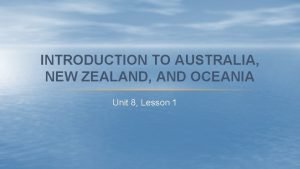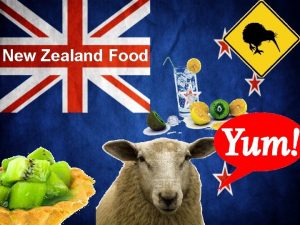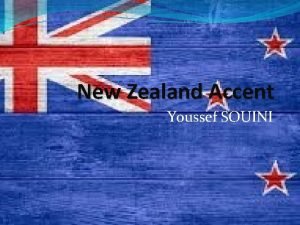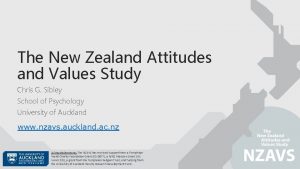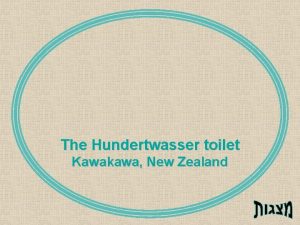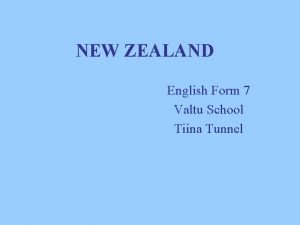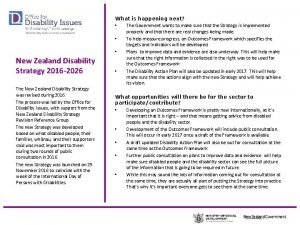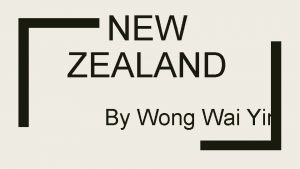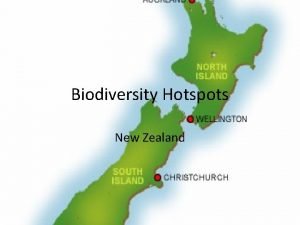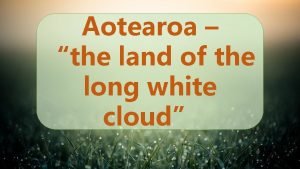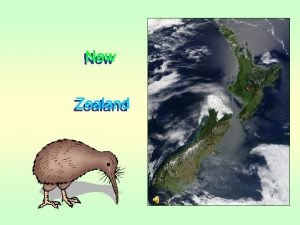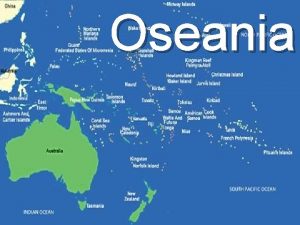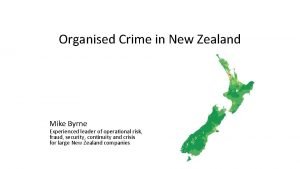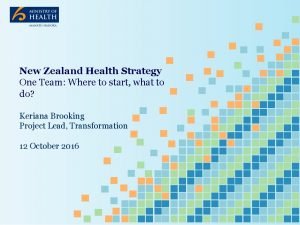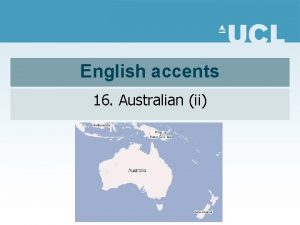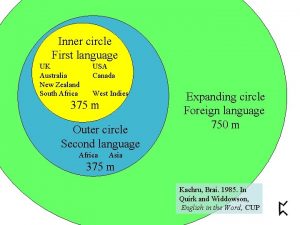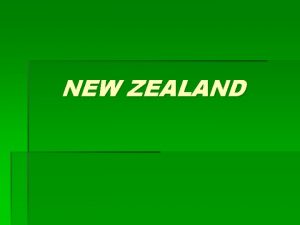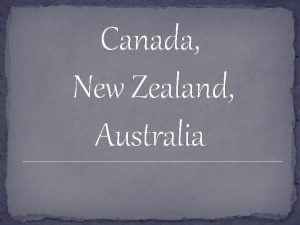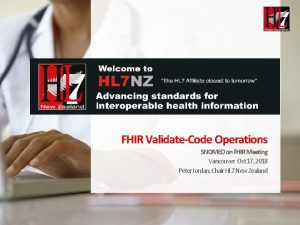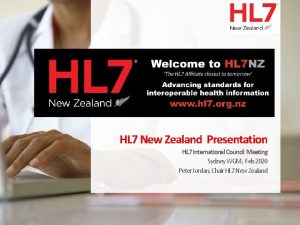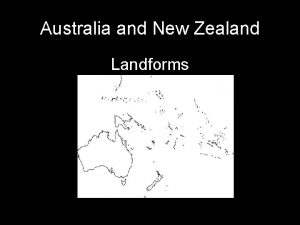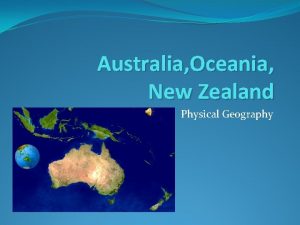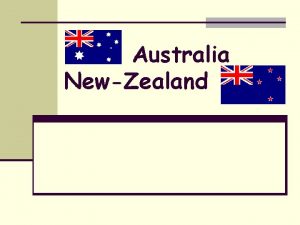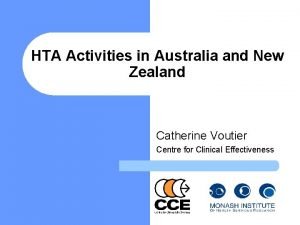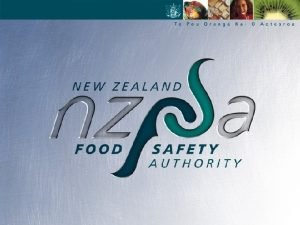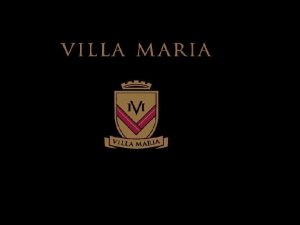Activities and Updates Food Standards Australia New Zealand






















- Slides: 22

Activities and Updates Food Standards Australia New Zealand Dr Sandra Cuthbert GM Food Safety and Corporate Food Standards Australia New Zealand

About FSANZ We are an Australian statutory agency within the Australian Government Health portfolio Our main function is to develop and administer the Australia New Zealand Food Standards Code (the Code) The Code is a legislative instrument, that is given effect by state and territory or New Zealand laws Not responsible for enforcement We are Risk Assessors, Risk Managers and Risk Communicators 03/11/2020 Food Standards Australia New Zealand 2

Food regulatory framework FSANZ POLICY • Standards Forum on Food Regulation • Coordination (Ministers) • Advice ENFORCEMENT • States and territories • NZ MPI • Agriculture (imported foods) 03/11/2020 Food Standards Australia New Zealand 3

Some of our current work Review of the Food Standards Code Plain English Allergen Labelling Chapter 3 and 4 Review Codex Alimentarius Commission Imported Food Risk Advice Food Recall and Incident Management Strawberry Tampering Incident Caffeine Toxicity Review 03/11/2020 Food Standards Australia New Zealand 4

Plain English Allergen Labelling

The Code Schedules General requirements for foods e. g. definitions, labelling, substances added to foods Compositional requirements for specific foods Lists, data and calculations that support the Standards in Chapters 1 -4. Allergen labelling requirements found here Food safety requirements Standards for agricultural commodities The Code requires allergens to be declared, but does not mention how they should be declared

Standard 1. 2. 3 Cereals containing gluten Sesame Seed (namely wheat, barley, rye, oats and hybrids) Milk Soy Tree nuts Milk Lupin Peanut Crustacea Egg Fish Sulphites

Issues with allergen labelling “Cereals containing gluten” E. g. “Wheat” V AG UE Clear Problem examples Unambiguous Identifiable “Sodium caseinate” T ECHNIC AL “Milk”

Proposal P 1044 - PEAL • Considering requirements for how allergens are to be declared • Aim is to provide clarity and consistency in allergen declaration requirements • Require PEAL as a means of improving allergen information for consumers. • Public consultation in the next few months.

Codex Alimentarius Commission • International food standards setting body established by FAO) and WHO. • As a WTO member, Australia is obliged to harmonise its domestic regulations with Codex standards. • This is also the case for other WTO member countries. 10

CCFH and CCFL • Two Codex Committees currently looking at allergen management and labelling: Ø Committee on Food Hygiene (CCFH) Ø Committee on Food Labelling (CCFL) 11

Codex allergen work • CCFH is developing a Code of Practice Ø For food business operators Ø Guidance for identifying allergens Ø Guidance on implementing allergen management practices • CCFL considering new work to revise international allergen labelling requirements Ø List of allergens that must be declared Ø How allergens must be declared (similar to the work being undertaken by FSANZ) Ø How to provide information on the unintended presence of allergens • Important to both committees’ work will be expert scientific advice requested from FAO. 12

Review of chapters 3 and 4 of the Food Standards Code Through-chain food safety management requirements

Food service proposal Chapter 3 Food safety standards Australia only • Food safety programs • Food safety practices and general requirements • Food premises and equipment • Food safety management requirements for food service and closely related retail sectors – Additional risk management tools 03/11/2020 14

High-risk horticulture PPP proposal Chapter 4 Primary production standards Australia only • • • Seafood Poultry meat Meat and meat products Dairy products Eggs and egg products Seed sprouts • On-farm food safety requirements for high-risk horticulture products – Consider measures to supplement industry schemes 03/11/2020 15

Imported Food Risk Advice

Imported food risk advice • Under the FSANZ Act, FSANZ develops assessment policies in relation to food imported into Australia – In practical terms – FSANZ provides imported food risk advice to the Department of Agriculture • Agriculture determines appropriate pre-border or at border controls to manage identified food safety risks 03/11/2020 17

Provision of advice • FSANZ provides advice on whether imported food potentially poses a medium or high risk • FSANZ can provide advice to Agriculture: – In response to an incident – On request from Agriculture – FSANZ review of ‘risk foods’ • (Imported Food Control Order, Schedule 1) 03/11/2020 18

Advice provided • FSANZ publishes the imported food risk advice – http: //www. foodstandards. gov. au/cons umer/importedfoods/Pages/FSANZadvice-on-imported-food. aspx • To date, advice published for 68 commodity: hazard pairs • Imported food risk assessment document detailing how the risk advice is prepared – http: //www. foodstandards. gov. au/publi cations/Pages/Importedfoodriskassessm ent. aspx 03/11/2020 19

Risk statement • Summarises: – Hazard identification – Severity – Risk factors – Risk mitigation – Outbreak data – Surveillance data – Level of risk 03/11/2020 20

Risk advice currently in progress • Human milk – 23 microbial and 7 chemical hazards • Cooked poultry meat – Listeria monocytogenes • Ready-to-eat cooked crustaceans – Listeria monocytogenes • Horticulture – (still in the scoping stage) 03/11/2020 21

Thank you Website www. foodstandards. gov. au Phone Australia: +61 2 6271 2222 New Zealand: +64 4 978 5630 /Food. Standards @FSANZnews Copyright © Food Standards Australia New Zealand 2019 This work is copyright. You may download, display, print and reproduce this material in unaltered form only (retaining this notice) for your personal, non-commercial use or use within your organisation. Apart from any other use as permitted under the Copyright Act 1968, all other rights are reserved. Requests for further authorisation should be directed to information@foodstandards. gov. au 03/11/2020 Food Standards Australia New Zealand 22
 Lesson 1: an introduction to oceania
Lesson 1: an introduction to oceania Internal medicine society of australia and new zealand
Internal medicine society of australia and new zealand Measurement standards laboratory of new zealand
Measurement standards laboratory of new zealand Kumara new zealand food
Kumara new zealand food New zealand vs australian accent
New zealand vs australian accent New zealand values and attitudes
New zealand values and attitudes Hundertwasser toilets nz
Hundertwasser toilets nz New zealand national sport
New zealand national sport New zealand disability strategy
New zealand disability strategy When was new zealand discovered
When was new zealand discovered Alpha lipid colostrum milk benefits
Alpha lipid colostrum milk benefits New zealand hot spot
New zealand hot spot New zealand official languages english
New zealand official languages english Capital of new zealand
Capital of new zealand Natives of new zealand
Natives of new zealand Urfolk new zealand
Urfolk new zealand Slidetodoc.com
Slidetodoc.com New zealand health strategy 2016
New zealand health strategy 2016 New zealand holiday 2016
New zealand holiday 2016 Nonrhotic
Nonrhotic New zealand nurse practitioner
New zealand nurse practitioner Saurabh paranjape photography
Saurabh paranjape photography Inner circle
Inner circle
